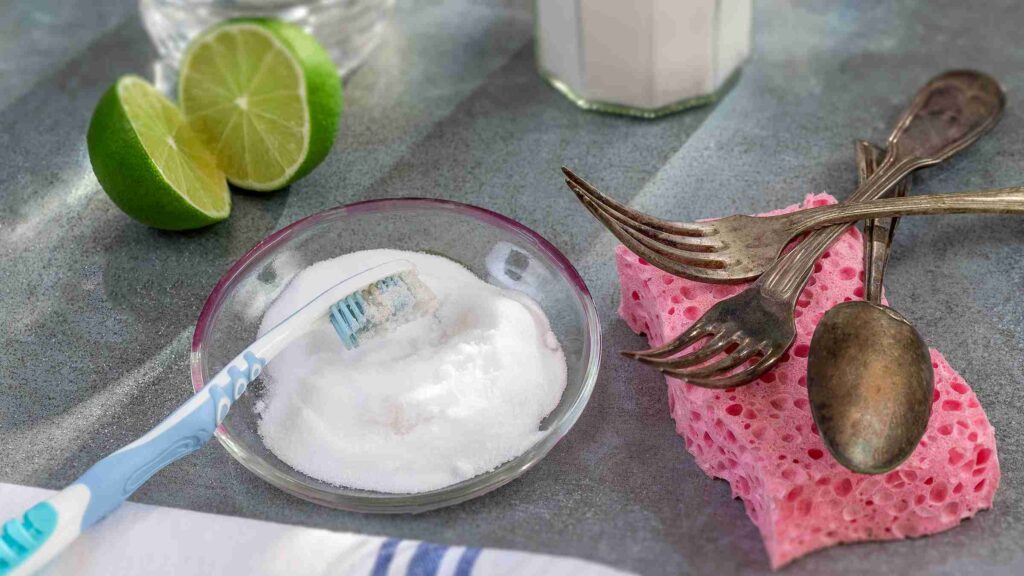Article Title: Vinegar + Baking Soda Paste: An Efficient Silverware Cleaner
Cleaning silverware is unforgivably intricate and imperative. Occasional sheen loss or tarnish marks not only render a displeasing appearance, but also contribute to early material degradation if not addressed timely. That’s precisely where Vinegar + Baking Soda Paste comes into play.
Product Overview
Vinegar + Baking Soda paste is a natural, homemade cleaning solution primarily used for polishing and restoring the shine of tarnished silverware. The paste, made by combining the two key ingredients, is easy-to-make, affordable, and tremendously effective.
Ease of Use
Preparing and using the cleaning paste is straightforward and requires no special setup. Simply mix 1/4 cup of baking soda with 2 tablespoons of white vinegar to create a thick, smooth paste. Apply this paste to tarnished silverware using a soft cloth or toothbrush, leave it on for 2-3 minutes, and then rinse with warm water, followed by immediate drying.
Cleaning Effectiveness
This natural paste performs admirably, revitalizing your silverware, removing light tarnishes, and restoring their original shine. However, for heavier tarnishes or delicate silver items, professional-grade silver cleaners might prove more effective.
Scent & Residue
The vinegar and baking soda paste do yield a slight scent of vinegar, however, its intensity fades away once the object is rinsed and dried. The paste doesn’t leave any streaks or residues behind when thoroughly rinsed, thus ensuring a clean and polished silverware.
Price & Availability
Price and availability are two of the strongest suits of this cleaning solution. Baking soda and white vinegar are pantry staples, virtually available at every grocery store or online marketplace at minimal costs. It’s arguably the most economically-friendly cleaning option for budget-conscious families.
Pros and Cons
The most striking pros include its natural composition, affordability, easy availability, and ease of use. Additionally, it’s environmentally friendly and safe around children and pets.
Yet, it’s not without a few cons. The slight vinegar smell can be off-putting for some individuals. The paste also requires a bit of elbow grease, particularly for heavier tarnishes. Lastly, it may not be suitable for fine silverware with intricate designs.
Comparison
Compared with other natural methods such as using toothpaste or a mixture of lemon juice and baking soda, the vinegar and baking soda paste is more versatile and equally effective. Professional silver cleaners might be more efficient for antique or larger silver items, yet the cost becomes a major factor for routine cleaning. The vinegar and baking soda paste outperforms in cost-effectiveness while also delivering similar results for less tarnished silverware.
Best Use Case
The vinegar and baking soda paste is ideal for households that have regular silverware, less intricately designed, and require frequent cleaning. It’s also an excellent option for budget-conscious families striving for environmentally-friendly solutions.
Final Verdict
I strongly recommend the Vinegar + Baking Soda paste as a natural silverware cleaner. Despite minor downsides, its numerous benefits, including cost-effectiveness, ease of use, wide availability, and green cleaning, make it a versatile household cleaner. It’s reliable for light to moderate tarnishing, and with a little bit of effort, your silverware can regain its lost splendor.
Silverware has both emotional and financial value, whether it is an antique piece from generations ago or part of your wedding gift. A simple homemade solution like the Vinegar + Baking Soda paste can maintain its value and luster. While it may not entirely replace professional-grade silver cleaners, it indeed stands as an efficient and economical tool for routine silverware maintenance.

